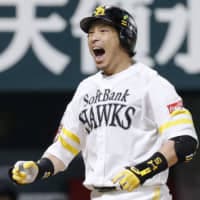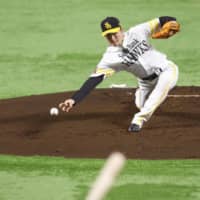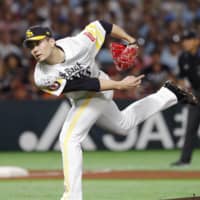The Sawamura Award is an honor given to the top pitcher in Japanese baseball each season.
Well, except when it isn’t.
For the first time since 2000, and the fifth time since the award was established in 1947, no pitcher was deemed worthy of the honor this season.
“This year, we had an unusually long debate and everyone was able to respectfully give their opinion,” said former pitcher Tsuneo Horiuchi, who served as chairman of the five-man committee of retired pitchers who voted on the honor this year. “After talking about various things, we decided there was no winner.”
Former pitchers Masaji Hiramatsu, Manabu Kitabeppu, Choji Murata and Hisashi Yamada also served on the committee, which was unchanged from last year.
“Of course there were names that came up. The strongest were (Shun) Yamaguchi and (Kohei) Arihara-kun,” Horiuchi said, referring to the pitchers of the Yomiuri Giants and Hokkaido Nippon Ham Fighters.
“We did our best to compare the two of them. But as the Sawamura selection committee, we also looked at their stability and if they had more than 15 wins and stood out in things such as innings pitched and complete games.
“We want as many players as possible to earn the experience of winning the Sawamura Award when they put up the numbers. But it’s still insufficient, and we don’t want the level of the Sawamura Award to drop. So the five of us came up with this decision.”
Yamaguchi was 15-4 with a 2.91 ERA and 188 strikeouts in 170 innings over 26 starts. He finished tied with Arihara for the most wins in NPB, led Japan with a .789 winning percentage and led the Central League with 188 strikeouts.
Arihara made 24 starts for the Fighters, going 15-8 with a 2.46 ERA and 161 strikeouts in 164⅓ innings. He led Japan’s qualified pitchers with a 0.92 walks plus hits per inning pitched.
They each cleared four of the seven benchmarks — 25 games started, 10 complete games, 15 wins, .600 winning percentage, 200 innings pitched, 150 strikeouts and an ERA of 2.50 or lower — used to evaluate candidates for the award.
Shota Imanaga, of the Yokohama BayStars, Fukuoka SoftBank Hawks ace Kodai Senga and the Orix Buffaloes’ Taisuke Yamaoka each satisfied three of the criteria.
No one, however, met the committee’s lofty standard.
“As a member of the committee, I would like everyone to remember once again the Sawamura Award has helped build the history of NPB and supported NPB’s great pitchers,” Murata said. “So my decision was nobody wins.
“Masaichi Kaneda, who died on Oct. 6, he was on another level. He had 20 or more wins for 14 straight years. He earned faith because he started, relieved and completed games. I want the media to understand the greatness of the Sawamura Award led to this decision.”
Kaneda was 86 when he passed away and pitched from 1950-1969.
The committee largely pinned their decision on the current state of pitcher usage in the Japanese game, noting few surpass 200 innings or throw more than a handful of complete games.
The Hiroshima Carp’s Daichi Osera (11-9, 3.53 ERA) led NPB with six complete games, while Senga (13-8, 2.79) was the innings leader with 180⅓.
“One player we wanted to win this award was Osera,” Horiuchi said. “He had six complete games. He was really good midway through the first half of the season, but slowed down later. His six complete games is a big number.
“Also Imanaga was mentioned. Of course, Senga, but he can do better.”
Like his fellow committee members, Yamada also expressed concern over changes in how pitchers are being used in recent years, noting the increased use of setup men and other relievers.
“The tendency to think that 100 pitches are enough is emphasized too much,” Yamada said. “That leads to the situation where the numbers are insufficient to win an award like Sawamura Award.
“I expect a pitcher who throws many innings and makes everyone feel like he can go the distance to come up, maybe one per team. Having that type pitcher is good for baseball. I keep thinking of the Sawamura Award from that point of view.”
Source : Baseball – The Japan Times


